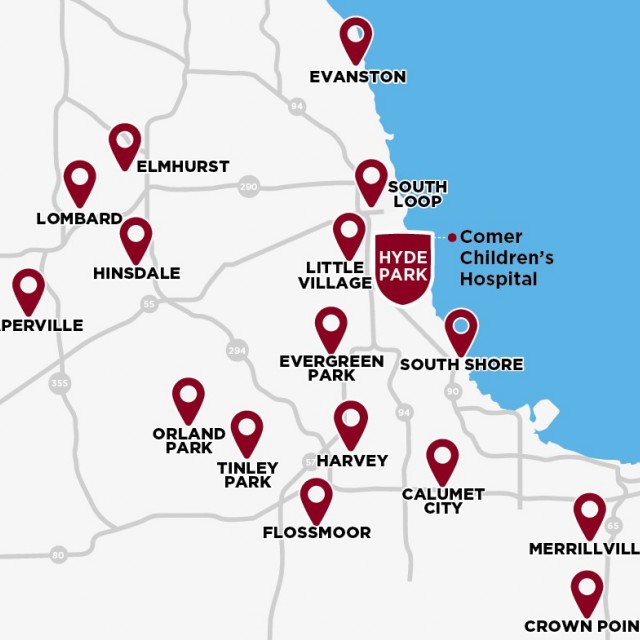At the heart of or critical care services Pediatric Intensive Care Unit (PICU). The 30-bed PICU is located on the third and fourth floors of Comer Children's. Twenty-four rooms are private with in-room sleeping accommodations for families. Parents of all patients are welcome to stay overnight with your child.

Sections & Programs
Critical Care Medicine
A multi-professional and interdisciplinary approach is utilized to provide patient and family centered care in the PICU. In addition to the critical care physicians, the care team consists of consulting physicians and surgeons, bedside critical care nurses, a full-time social worker, certified child life specialists, case managers, pharmacists and respiratory therapists. Individuals from these diverse specialty areas work together to provide care that extends well beyond that which is required for the medical/surgical condition at hand. A senior critical care physician is in the PICU and available 24 hours a day. Equipped with the most advanced technology, our team diligently works to improve survival, encourage meaningful and speedy recovery, minimize disability, and relieve pain and suffering in a consistently respectful and caring manner.

Nancy Ghanayem, MD - Professor of Pediatrics
Section Chief, Pediatric Critical Care Medicine
|
|
|
|
|
|
|
|
|
|
|
|
|
|
|
|
|
|
|
|
|
|
|
|
|
|
|
|
|
About Our Section
Special Services
At Comer Children's, pediatric services are integrated into critical care medicine. We offer a range of sedation options for children undergoing diagnostic exams or surgical procedures. Our goal is to make your child as comfortable as possible and relieve any fear or anxiety while managing his or her care in a safe and effective manner.
Nurses specializing in intensive care, sedation and invasive procedures work seamlessly with critical care physicians leading the care team. In addition, child life specialists are available to help your child through developmentally appropriate play and education.
The Pediatric Comfort and Integrative Care Team helps to relieve symptoms and optimize the quality of life for children facing serious illnesses. Pain can be one of the most stressful parts of our child's illness. Our team offers a variety of methods to comfort your child and ease his or her distress A physician and nurse practitioner will work closely with your family and the primary care team on quality of life decision-making, as well as pain and symptom management.
Extracorporeal membrane oxygenation (ECMO) is a treatment that delivers oxygen and pumps blood to a patient whose heart or lungs are not currently working due to illness. ECMO can help these organs rest and heal while physicians work to manage the underlying medical condition. W are an ELSO Gold Center for Excellence for ECMO.

Award-Winning Pediatric Sedation Program
As a designated Center of Excellence in Pediatric Sedation by the Society for Pediatric Sedation, Comer Children's is committed to safe and effective procedural sedation. Our experts apply current best practices in a patient- and family-centered environment with continual self-review, evaluation and changes aimed at achieving the highest quality of care with efficient use of limited health care resources.



